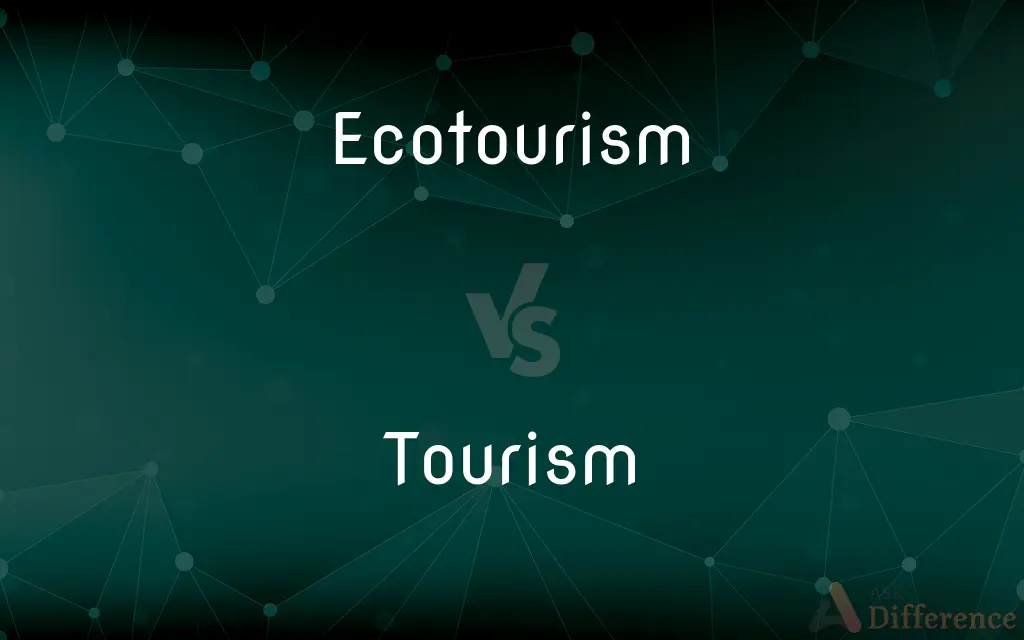Ecotourism vs. Tourism — What's the Difference?
By Tayyaba Rehman — Updated on October 25, 2023
Ecotourism focuses on responsible travel to natural areas, while Tourism is the broader act of traveling for pleasure or business.

Difference Between Ecotourism and Tourism
Table of Contents
ADVERTISEMENT
Key Differences
Ecotourism is a subset of tourism that emphasizes the importance of traveling to natural environments with an intent to observe, appreciate, and help conserve the environment and the well-being of local people. Tourism, on the other hand, encompasses a wide variety of travel reasons, from leisure to business, without a specific focus on environmental responsibility.
Ecotourism advocates for minimal impacts on the environment and promotes a deeper understanding of natural areas. Tourism, in its general sense, might not always prioritize such environmental considerations, but it plays a crucial role in global economics, providing millions with employment and cultural exchange opportunities.
In terms of destinations, ecotourism often leads travelers to more remote or pristine locations with rich biodiversity. Tourism as a whole can lead travelers to a wide range of places, including bustling cities, historic sites, or popular beach resorts.
Economically, ecotourism aims to funnel tourism revenue directly into local communities and conservation efforts. Tourism's broader economy, while often benefiting regions and countries, may not always directly support local communities or prioritize environmental preservation.
For travelers, the motivation behind ecotourism is often educational and ethical, fostering a deeper connection with nature and cultures. With tourism, motivations can range from relaxation, cultural exploration, business meetings, or just an escape from daily life.
ADVERTISEMENT
Comparison Chart
Focus
Conservation and local community benefits.
Travel for leisure, business, or other reasons.
Destinations
Natural, biodiverse, and often remote areas.
Any place, including cities, beaches, monuments.
Economic Impact
Direct benefits to local communities and nature.
Broader economic benefits to regions/countries.
Motivation
Educational, ethical, and environmental concerns.
Relaxation, exploration, business, etc.
Environmental Impact
Often minimal, promotes sustainability.
Varies, not always environmentally conscious.
Compare with Definitions
Ecotourism
Ecotourism promotes education and appreciation of the environment and cultures.
Through ecotourism, travelers gained a deeper respect for the Arctic's fragile ecosystem.
Tourism
Tourism is a significant source of income for many countries and regions.
Tourism in Paris contributes massively to France's GDP.
Ecotourism
Ecotourism seeks to minimize environmental impact while promoting cultural understanding.
Through ecotourism, Jane learned about the traditions of the Maasai while supporting their community.
Tourism
Tourism is an activity where people visit places outside their usual environment.
European tourism offers a mix of history, culture, and natural beauty.
Ecotourism
Ecotourism is travel to natural areas focusing on conservation and benefiting local communities.
The Amazon trip focused on ecotourism, emphasizing rainforest preservation.
Tourism
Tourism involves traveling for pleasure, relaxation, or exploration.
The rise of tourism in Bali has greatly boosted its economy.
Ecotourism
Ecotourism emphasizes sustainable travel practices in sensitive ecological areas.
Ecotourism in the Galápagos ensures the unique species are protected for generations.
Tourism
Tourism includes travel for business, leisure, and personal reasons.
Business tourism to Silicon Valley is quite popular among tech entrepreneurs.
Ecotourism
Ecotourism is about experiencing nature in ways that prioritize its preservation.
The ecotourism venture ensured no harm came to the coral reefs they visited.
Tourism
Tourism is travel for pleasure or business; also the theory and practice of touring, the business of attracting, accommodating, and entertaining tourists, and the business of operating tours. The World Tourism Organization defines tourism more generally, in terms which go "beyond the common perception of tourism as being limited to holiday activity only", as people "traveling to and staying in places outside their usual environment for not more than one consecutive year for leisure and not less than 24 hours, business and other purposes".
Ecotourism
Ecotourism is a form of tourism involving responsible travel to natural areas, conserving the environment, and improving the well-being of the local people. Its purpose may be to educate the traveler, to provide funds for ecological conservation, to directly benefit the economic development and political empowerment of local communities, or to foster respect for different cultures and for human rights.
Tourism
The commercial organization and operation of holidays and visits to places of interest
The tourism industry
A national fund for the promotion of tourism
Ecotourism
Tourism that involves visiting scenic or remote natural areas while attempting to minimize negative impacts on the environment and on the local inhabitants.
Tourism
The practice of traveling for pleasure.
Ecotourism
Responsible (sustainable#Adjective) travel to natural areas supporting the fauna, flora, and local economy.
Tourism
The business of providing tours and services for tourists.
Ecotourism
Tourism to exotic or threatened ecosystems to observe wildlife or to help preserve nature
Tourism
The act of travelling or sightseeing, particularly away from one's home.
Mass tourism damaged the beach.
Tourism
The industry in which such travels and sightseeing are organized.
Tourism brings a lot of tax revenue to the area.
Tourism
(figurative) The act of visiting another region or jurisdiction for a particular purpose.
Libel tourism; suicide tourism; sex tourism
Tourism
The business of providing services to tourists;
Tourism is a major business in Bermuda
Tourism
Tourism can encompass both international and domestic travel for various reasons.
Tourism to New York City skyrocketed during the holiday season.
Common Curiosities
How does tourism differ from ecotourism?
While tourism is the act of traveling for various reasons, ecotourism specifically focuses on traveling to natural areas with an emphasis on conservation and local community benefits.
Is all travel to natural areas considered ecotourism?
No, only when travel prioritizes conservation, education, and benefits to local communities is it considered ecotourism.
What is the primary aim of ecotourism?
The primary aim of ecotourism is to promote conservation, benefit local communities, and educate travelers.
Can tourism have an eco-friendly approach?
Yes, tourism can adopt eco-friendly practices, but it won't necessarily meet all the criteria of ecotourism.
How has ecotourism impacted traditional tourism?
Ecotourism has influenced traditional tourism by raising awareness about environmental and cultural preservation, leading to more sustainable practices in the wider tourism industry.
Are there certifications for ecotourism operators?
Yes, various organizations offer certifications for ecotourism operators to ensure they adhere to sustainable and ethical standards.
Can urban areas promote ecotourism?
While traditionally associated with natural areas, urban settings can adopt ecotourism principles by emphasizing sustainability, local culture, and education.
Is leisure the only reason for tourism?
No, tourism encompasses various reasons, including business, education, and personal reasons.
How can tourism destinations manage the environmental impact of increased visitor numbers?
They can adopt sustainable practices, limit visitor numbers during peak times, invest in infrastructure, and promote off-peak travel.
Why is tourism important for economies?
Tourism generates revenue, provides employment, boosts local businesses, and fosters international relations.
Can tourism harm environments?
Yes, if not managed properly, tourism can lead to environmental degradation and overexploitation.
Are all ecotourism activities nature-based?
While many are, ecotourism can also focus on cultural experiences, provided they benefit local communities and foster understanding.
How can travelers ensure their trip is eco-friendly?
Travelers can choose certified ecotourism operators, minimize waste, respect local customs, and support local businesses.
How do ecotourism and tourism contribute to cultural exchanges?
Ecotourism emphasizes understanding and respecting local cultures, while tourism facilitates interactions between different cultures and peoples.
Can a tourist activity be both leisure and ecotourism?
Yes, if a leisure activity in a natural setting also emphasizes conservation, education, and local community benefits, it can be considered ecotourism.
Share Your Discovery

Previous Comparison
Headband vs. Hairband
Next Comparison
Relationship vs. CorrelationAuthor Spotlight
Written by
Tayyaba RehmanTayyaba Rehman is a distinguished writer, currently serving as a primary contributor to askdifference.com. As a researcher in semantics and etymology, Tayyaba's passion for the complexity of languages and their distinctions has found a perfect home on the platform. Tayyaba delves into the intricacies of language, distinguishing between commonly confused words and phrases, thereby providing clarity for readers worldwide.














































